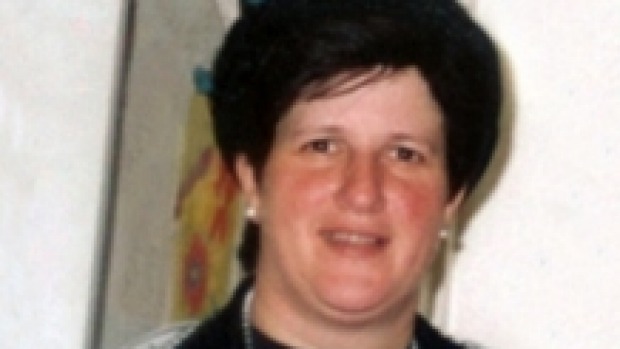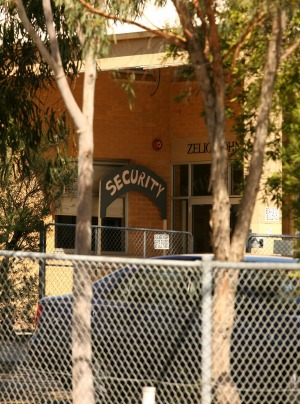Malka Leifer: Former Australian principal accused of 74 child sex charges walks free in Israel
The Age
3 June 2016
 Malka Leifer remains in Israel, where she will be assessed by psychiatrists.
Malka Leifer remains in Israel, where she will be assessed by psychiatrists.
The former principal of an ultra-Orthodox girls' school in Melbourne, who fled the country after allegedly sexually abusing her students, could remain in Israel indefinitely with a court ruling she is mentally unfit to face extradition.
Alleged paedophile Malka Leifer will walk free, her home detention in Israel lifted, after Jerusalem District Court judge Amnon Cohen ordered she undergo psychiatric treatment that could go on for years.
Ms Leifer, the former principal of the Adass Israel School in Elsternwick, is wanted by Victoria Police on 74 counts of sexual assault and rape involving girls.
The former principal fled to Israel with her family in the middle of the night, allegedly with the help of senior members of Melbourne's secretive Adass community, after accusations of sexual abuse were first raised against her in 2008.
In 2014, she was arrested by Israeli police at the request of Australian authorities. Since then, she has been living under house arrest in the ultra-orthodox enclave of Bnei Brak in central Israel.
However, she has managed to evade 10 extradition proceedings, with her lawyers consistently arguing she is unwell and unfit to face court. Her lawyers have said she experiences panic attacks and bouts of depression as each court hearing approaches.
Alleged paedophile Malka Leifer will walk free, her home detention in Israel lifted, after Jerusalem District Court judge Amnon Cohen ordered she undergo psychiatric treatment that could go on for years.
Ms Leifer, the former principal of the Adass Israel School in Elsternwick, is wanted by Victoria Police on 74 counts of sexual assault and rape involving girls.
The former principal fled to Israel with her family in the middle of the night, allegedly with the help of senior members of Melbourne's secretive Adass community, after accusations of sexual abuse were first raised against her in 2008.
In 2014, she was arrested by Israeli police at the request of Australian authorities. Since then, she has been living under house arrest in the ultra-orthodox enclave of Bnei Brak in central Israel.
However, she has managed to evade 10 extradition proceedings, with her lawyers consistently arguing she is unwell and unfit to face court. Her lawyers have said she experiences panic attacks and bouts of depression as each court hearing approaches.
 Adass Israel Girls School in Elsternwick, where Malka Leifer was principal from 2003 to 2008 (photo: Pat Scala PDS).
Adass Israel Girls School in Elsternwick, where Malka Leifer was principal from 2003 to 2008 (photo: Pat Scala PDS).
Earlier this year, the Jerusalem court suspended all legal proceedings against the former principal until Ms Leifer received psychiatric treatment.
On Thursday, a long-awaited report from the district psychiatrist found Ms Leifer was mentally unwell.
Judge Cohen subsequently ruled Ms Leifer was mentally unfit to face extradition, lifted her home detention and ordered she receive outpatient treatment in a Jerusalem clinic.
The court heard Ms Leifer's treatment was due to begin next week and was expected to last initially for six months.
She would receive up to five treatments during that time, the court heard, until a committee reassessed whether she was fit to stand trial.
The court ruled that process could go on for up to 10 years.
If the committee continually finds she is unfit to stand, she may evade her extradition trial indefinitely.
Since the request for extradition first reached court on August 2014, Ms Leifer has had five different psychiatric assessments.
Solicitor Nick Mazzeo, who has acted for abuse victims at the Adass Israel School, said they were "devastated" about the news.
"The decision has further exacerbated the trauma these victims have gone through and are still going through," said Mr Mazzeo, of Lennon Mazzeo law firm.
"I'm hopeful that there will be an appeal of the decision, if the prosecutor believes that that is possible."
Michelle Meyer, the chief executive of Jewish victims support group Tzedek, said Ms Leifer had "manipulated the system" and was doing everything to avoid extradition.
"She has been well enough all this time to continue living, raising her family and possibly working, that doesn't suggest to me that she is unable to be extradited."
She said the alleged victims were angry and despondent.
"They were pinning their hopes on getting some closures, but there is still no closure," Ms Meyer said.
"For a lot of them, the healing process will be put on hold. They have been left in the lurch."
A spokeswoman for the Attorney-General's Department said Australian authorities were working with Israeli authorities regarding the next steps in the extradition process.
"Australia retains a strong extradition interest in Ms Leifer who is wanted to face prosecution in Victoria for serious criminal conduct relating to 74 sexual assault offences," she said.
They said it would be inappropriate to comment further.
Manny Waks, who heads an organisation aiming to prevent sexual abuse in Jewish communities, said Ms Leifer's alleged victims "feel outraged, devastated and completely let down by Israel's legal system".
Several of Ms Leifer's victims are living in Israel.
"They are also fearful of bumping into her on the street," Mr Waks said.
Another victim of abuse in the Jewish community, who did not want to be named, said the judge's decision was "disgraceful".
"That the judge gave more weight to the psychological status of the perpetrator than the turmoil and disruption to the lives of those affected only deepens sense of injustice.
"At the end of the Second World War, people like Eichmann were extradited to Israel to face trials for their crimes, yet Israel is standing in the way of the extradition of a person who is wanted under the most serious of charges. I find this hypocritical at the highest level."
Jennifer Huppert, president of the Jewish Community Council of Victoria, said the community was overwhelmingly disappointed by the decision.
"The victims themselves have said in court proceedings and at the royal commission that they feel they need to have had this matter heard in a court in Australia, and we are concerned about the victims and we sympathise with their point of view.
"We are extremely disappointed by the decision, we think it's important for the victims that they feel they can have their day in court, and they have the right to have their day in court."
Jewish Community Watch representative Shana Aaronson was shocked by the judge's ruling.
"Disappointed isn't really a strong enough word. For the [alleged] victims in Australia this has dragged on and on for them and it's horrible," she said.
The Israeli prosecutor's office has been given 72 hours to appeal the lifting of the house arrest, which it is understood it will do.
Originally published at The Age.
On Thursday, a long-awaited report from the district psychiatrist found Ms Leifer was mentally unwell.
Judge Cohen subsequently ruled Ms Leifer was mentally unfit to face extradition, lifted her home detention and ordered she receive outpatient treatment in a Jerusalem clinic.
The court heard Ms Leifer's treatment was due to begin next week and was expected to last initially for six months.
She would receive up to five treatments during that time, the court heard, until a committee reassessed whether she was fit to stand trial.
The court ruled that process could go on for up to 10 years.
If the committee continually finds she is unfit to stand, she may evade her extradition trial indefinitely.
Since the request for extradition first reached court on August 2014, Ms Leifer has had five different psychiatric assessments.
Solicitor Nick Mazzeo, who has acted for abuse victims at the Adass Israel School, said they were "devastated" about the news.
"The decision has further exacerbated the trauma these victims have gone through and are still going through," said Mr Mazzeo, of Lennon Mazzeo law firm.
"I'm hopeful that there will be an appeal of the decision, if the prosecutor believes that that is possible."
Michelle Meyer, the chief executive of Jewish victims support group Tzedek, said Ms Leifer had "manipulated the system" and was doing everything to avoid extradition.
"She has been well enough all this time to continue living, raising her family and possibly working, that doesn't suggest to me that she is unable to be extradited."
She said the alleged victims were angry and despondent.
"They were pinning their hopes on getting some closures, but there is still no closure," Ms Meyer said.
"For a lot of them, the healing process will be put on hold. They have been left in the lurch."
A spokeswoman for the Attorney-General's Department said Australian authorities were working with Israeli authorities regarding the next steps in the extradition process.
"Australia retains a strong extradition interest in Ms Leifer who is wanted to face prosecution in Victoria for serious criminal conduct relating to 74 sexual assault offences," she said.
They said it would be inappropriate to comment further.
Manny Waks, who heads an organisation aiming to prevent sexual abuse in Jewish communities, said Ms Leifer's alleged victims "feel outraged, devastated and completely let down by Israel's legal system".
Several of Ms Leifer's victims are living in Israel.
"They are also fearful of bumping into her on the street," Mr Waks said.
Another victim of abuse in the Jewish community, who did not want to be named, said the judge's decision was "disgraceful".
"That the judge gave more weight to the psychological status of the perpetrator than the turmoil and disruption to the lives of those affected only deepens sense of injustice.
"At the end of the Second World War, people like Eichmann were extradited to Israel to face trials for their crimes, yet Israel is standing in the way of the extradition of a person who is wanted under the most serious of charges. I find this hypocritical at the highest level."
Jennifer Huppert, president of the Jewish Community Council of Victoria, said the community was overwhelmingly disappointed by the decision.
"The victims themselves have said in court proceedings and at the royal commission that they feel they need to have had this matter heard in a court in Australia, and we are concerned about the victims and we sympathise with their point of view.
"We are extremely disappointed by the decision, we think it's important for the victims that they feel they can have their day in court, and they have the right to have their day in court."
Jewish Community Watch representative Shana Aaronson was shocked by the judge's ruling.
"Disappointed isn't really a strong enough word. For the [alleged] victims in Australia this has dragged on and on for them and it's horrible," she said.
The Israeli prosecutor's office has been given 72 hours to appeal the lifting of the house arrest, which it is understood it will do.
Originally published at The Age.